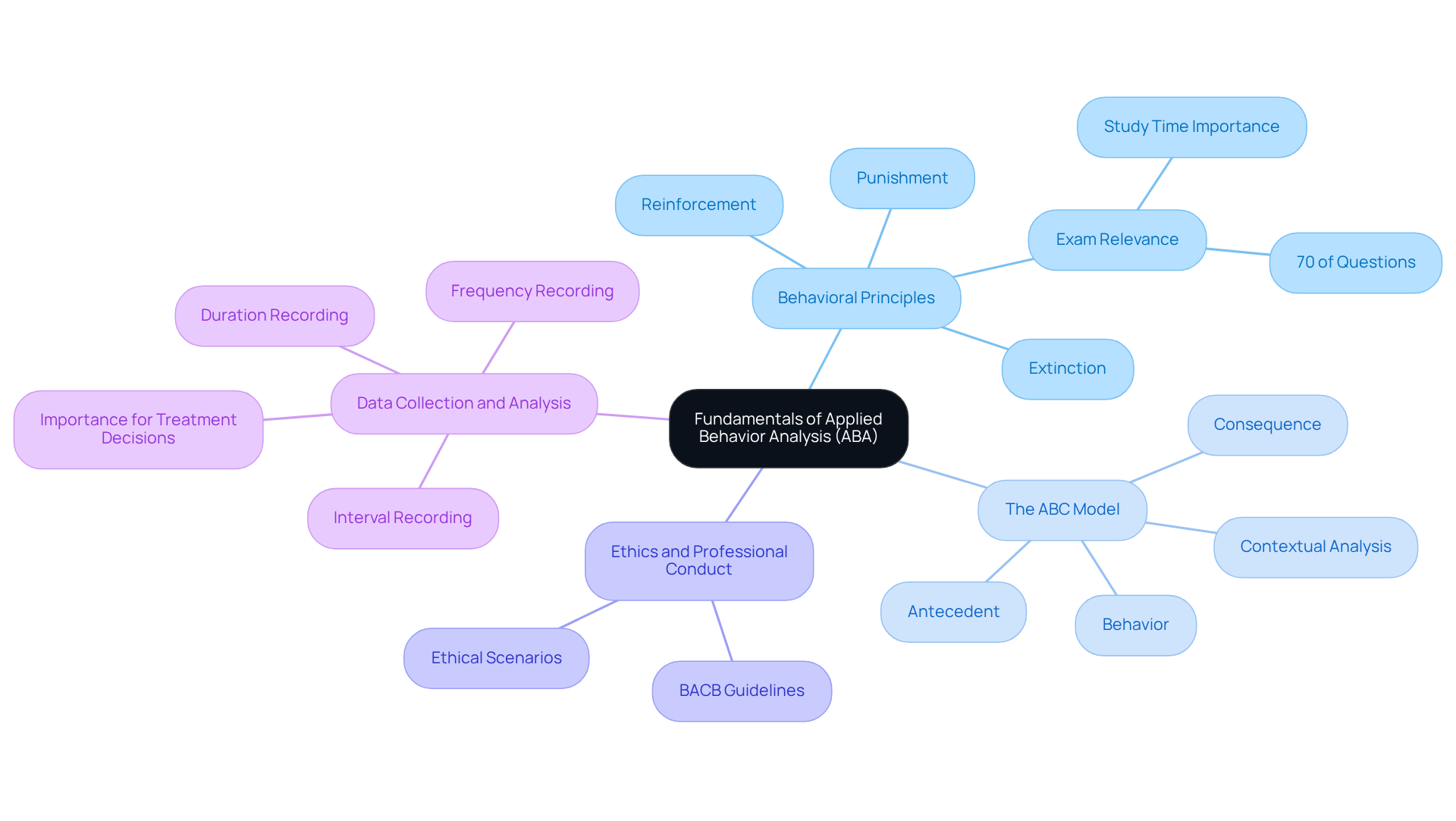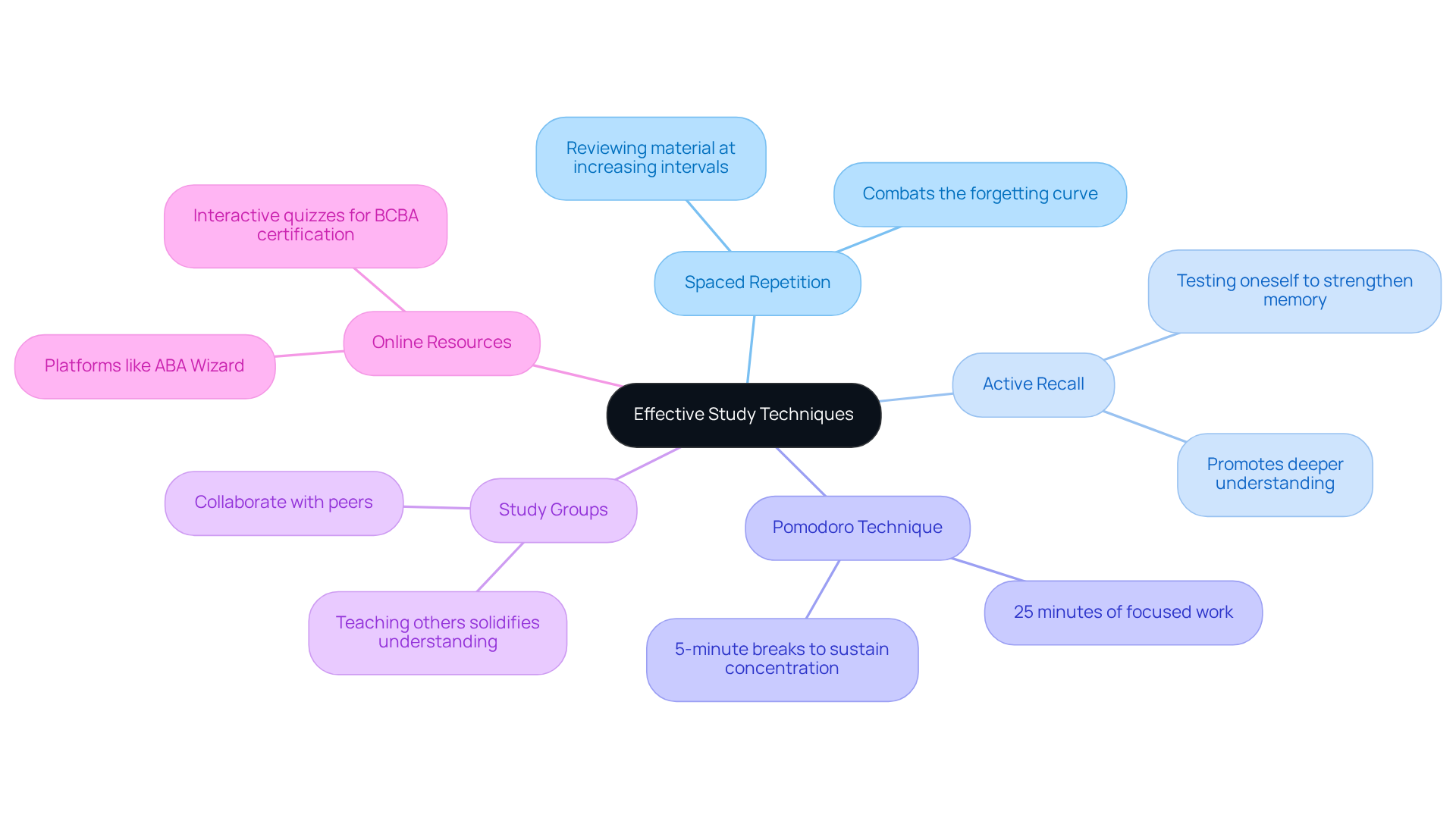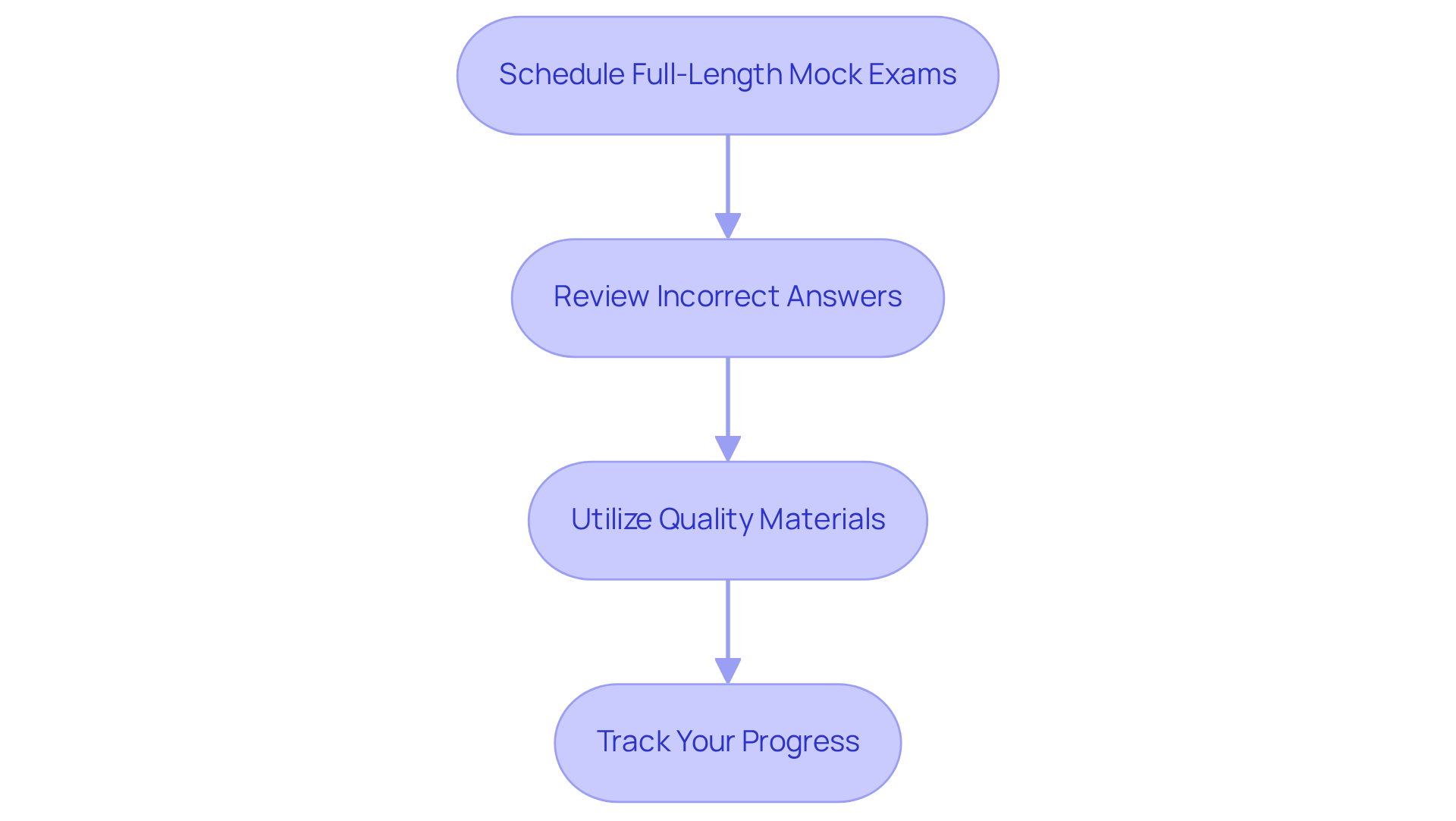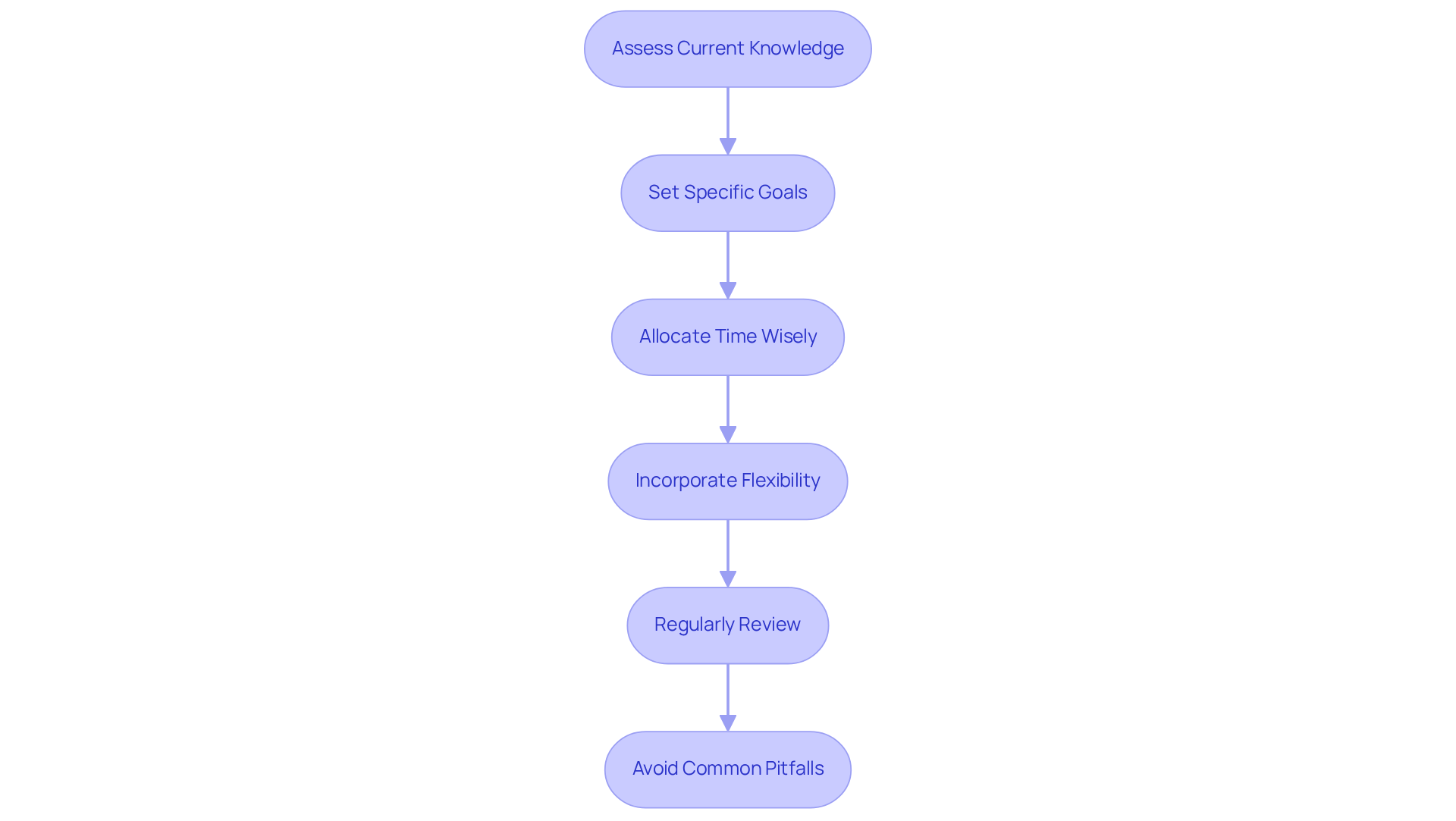June 27, 2025

The demand for Board Certified Behavior Analysts (BCBAs) continues to rise, underscoring the importance of effective preparation for the certification exam. This article outlines four effective steps for reviewing and preparing for the BCBA exam: mastering ABA fundamentals, utilizing effective study techniques, incorporating practice exams, and creating a structured study plan. Each step is supported by evidence, highlighting the critical role of understanding key principles in Applied Behavior Analysis (ABA).
First, mastering ABA fundamentals is essential. A strong grasp of these principles forms the foundation for success in the exam. Engaging in active learning—such as discussing concepts with peers or teaching others—can significantly enhance retention and understanding.
Next, employing effective study techniques is crucial. Techniques such as spaced repetition and summarization can improve information retention. How do your current study methods measure up? Consider integrating these techniques to optimize your preparation.
Incorporating practice exams is another vital step. Regularly assessing your progress through practice exams not only familiarizes you with the exam format but also identifies areas needing further review. This targeted approach can enhance your confidence and performance on the actual exam day.
Finally, creating a structured study plan is key to maintaining focus and motivation. A well-organized schedule allows for consistent study sessions, ensuring that all topics are covered comprehensively. Are you ready to take control of your study journey?
By following these steps, you can significantly enhance your likelihood of passing the BCBA certification exam. Embrace these strategies, and position yourself for success in the field of behavior analysis.
The journey to becoming a Board Certified Behavior Analyst (BCBA) is both challenging and rewarding, requiring a solid grasp of Applied Behavior Analysis (ABA) principles and effective study strategies.
With the demand for qualified BCBAs on the rise, candidates must equip themselves with the right tools and techniques to excel in their certification exams.
What if there was a systematic approach that could enhance understanding of critical ABA concepts while boosting confidence and performance on test day?
This article outlines four essential steps to develop effective ABA exam review strategies, ensuring candidates are well-prepared to tackle the assessment and achieve their professional goals.
To successfully prepare for the Board Certified Behavior Analyst assessment, it is essential to grasp the fundamental principles of (ABA). Consider the following key areas:
Utilizing various resources, such as textbooks, online courses, and cooperative study groups, can significantly enhance your understanding of these concepts and increase your chances of success in the assessment. Notably, clients employing Mastery Modules for certification preparation experience an average score enhancement of 12%. Furthermore, graduating from accredited programs correlates with improved pass rates on the BCBA exam, with the overall pass rate for first-time candidates being approximately 65%. This highlights the importance of thorough preparation.

To maximize your study efforts, consider implementing the following techniques:

Incorporating practice assessments into your study routine is not just beneficial; it is crucial for success. Consider this: the demand for Board Certified Behavior Analysts (BCBAs) continues to rise, making effective preparation essential. Here’s how to integrate practice assessments effectively:
In the words of seasoned BCBAs, full-length practice tests are invaluable for building confidence and familiarity with the structure, ultimately enhancing your chances of success. As observed by Laura NG, the varying pass rates indicate the necessity for comprehensive preparation, making it crucial to employ effective learning strategies. Are you ready to elevate your study routine and ensure your success on assessment day?

To create an effective study plan for the BCBA exam, consider the following essential steps:
By following these steps, candidates can develop a tailored study plan that not only deepens their understanding of ABA concepts but also increases their chances of passing the BCBA exam on the first attempt with the support of an ABA exam review.

Mastering the Board Certified Behavior Analyst (BCBA) exam is essential in today's growing demand for qualified professionals in behavior analysis. A strategic approach is crucial, encompassing a deep understanding of the core principles of Applied Behavior Analysis (ABA), effective study techniques, practice assessments, and a structured study plan. By focusing on these areas, candidates can significantly enhance their preparation and increase their chances of success on the exam.
Key strategies include:
Ultimately, the path to passing the BCBA exam is paved with diligent preparation and a commitment to mastering both the theoretical and practical aspects of ABA. By adopting these effective review strategies, individuals can bolster their confidence and position themselves for a successful career in behavior analysis. Embrace these strategies today and take proactive steps toward achieving your certification goals.
What is the importance of understanding the fundamentals of Applied Behavior Analysis (ABA) for the Board Certified Behavior Analyst assessment?
Understanding the fundamentals of ABA is crucial for success on the assessment, as it helps candidates grasp key concepts that frequently appear in exam questions.
What are the key behavioral principles to focus on for the certification exam?
Candidates should master the principles of reinforcement, punishment, and extinction, as approximately 70% of behavior analyst certification questions pertain to these foundational concepts.
What is the ABC Model in the context of ABA?
The ABC Model stands for Antecedent-Behavior-Consequence and is essential for analyzing behavior across various contexts, helping to understand how different stimuli influence behavior.
Why is it important to review ethics and professional conduct for the certification assessment?
Ethical scenarios are commonly included in the assessment, making it vital for candidates to comprehend the ethical guidelines established by the Behavior Analyst Certification Board (BACB).
What data collection methods should candidates be proficient in for the certification test?
Candidates should gain proficiency in various data collection methods, including frequency, duration, and interval recording, to analyze and interpret data effectively.
How can candidates enhance their understanding of ABA concepts?
Utilizing resources such as textbooks, online courses, and cooperative study groups can significantly enhance understanding and increase the chances of success in the assessment.
What impact do Mastery Modules have on certification preparation?
Clients using Mastery Modules for certification preparation experience an average score enhancement of 12%.
How does graduating from accredited programs affect pass rates on the BCBA exam?
Graduating from accredited programs correlates with improved pass rates, with the overall pass rate for first-time candidates being approximately 65%.
Our expert recruitment strategies and AI-driven sourcing ensure that you receive top-notch candidates quickly, without compromising on quality. Whether you’re looking for BCBAs, Clinical Directors, or RBTs, we’ve got you covered.